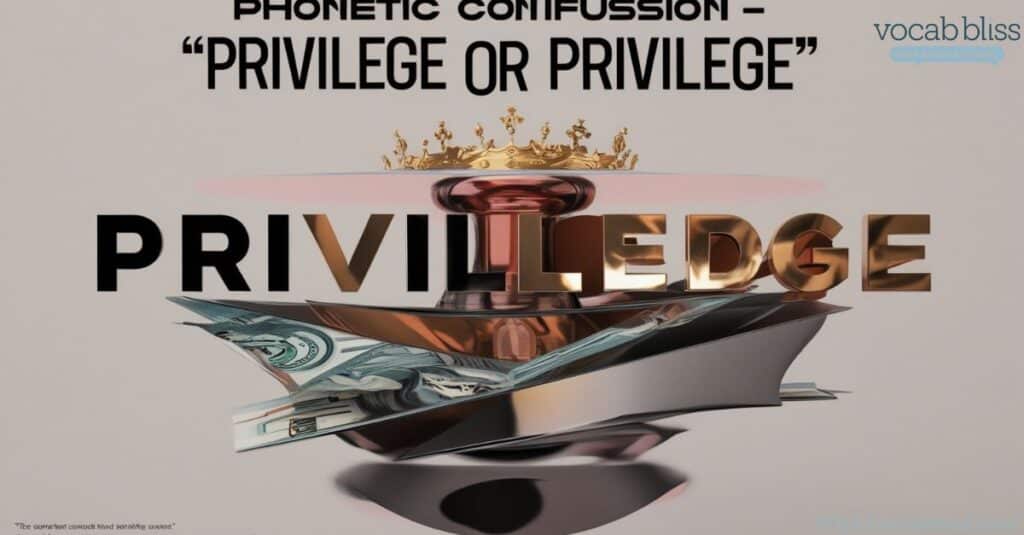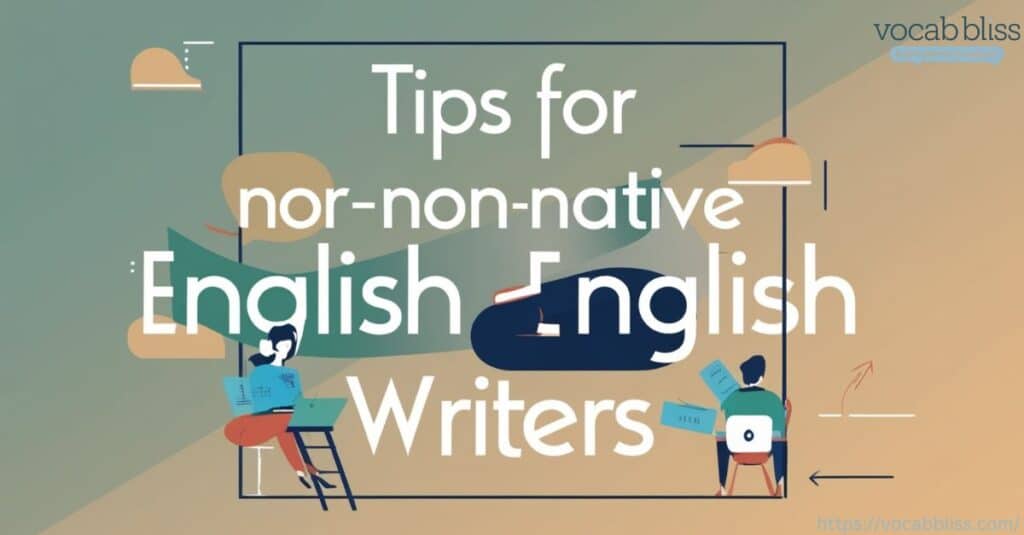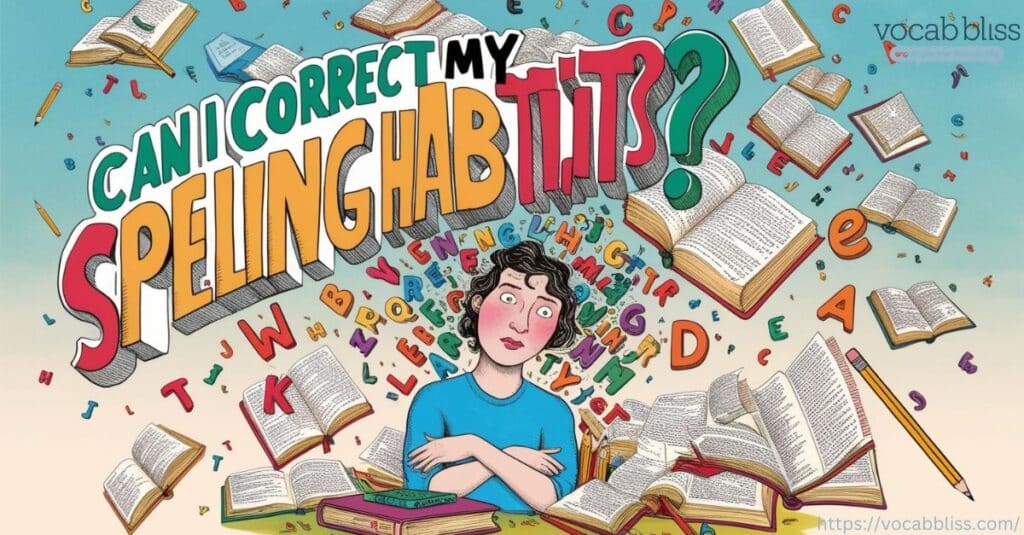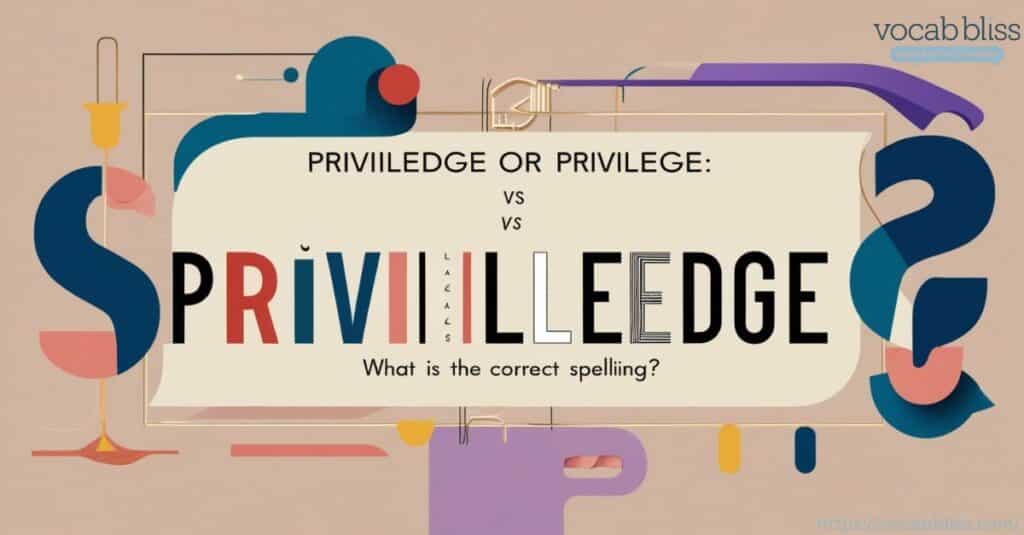Spelling errors can impact how readers perceive your writing. While some mistakes go unnoticed, others, like confusing “privilege or priviledge” can stand out and disrupt your credibility. This article dives deep into why this common mistake happens, clarifies the correct spelling, and provides strategies to ensure you spell it right every time. Let’s take a detailed look at the differences, definitions, and common pitfalls surrounding these words.
Quick Summary
Confused about whether to use “privilege” or “priviledge”? You’re not alone. The correct spelling is “privilege,” a term that denotes a special right or benefit. The common misspelling, “priviledge,” stems from phonetic confusion and the influence of similar-sounding words. This guide explains why the error occurs, outlines proper usage, and provides tips to help you remember the correct spelling. By mastering “privilege,” you’ll boost the credibility of your writing and avoid common spelling pitfalls.
Understanding the Difference Between “Privilege vs Priviledge”
One of the most frequent spelling errors in English involves the words “priviledge vs privilege“ Understanding the correct spelling is essential for professional, academic, and personal writing.
Definition and Proper Usage of “Privilege”
Privilege is a noun that signifies a special right, advantage, or benefit granted to a particular person or group. Additionally, the term is commonly used in legal, social, and personal contexts. Historically, the word originates from the Latin privilegium, meaning “a law affecting an individual.”
Examples of privilege:
- Social: “Access to healthcare is often seen as a privilege rather than a right.”
- Legal: “Confidential information shared between an attorney and client falls under attorney-client privilege.”
- Personal: “It was a privilege to meet such an influential leader.”
how do you Spell Privileged Correctly
The past participle and adjective form “privileged” maintains the correct root spelling. In fact, this form is often used to describe someone who benefits from special rights or advantages. Consequently, it highlights the individual’s access to unique benefits or opportunities.
Example: “She felt privileged to study at a prestigious university.”

Discover more: Totalling or Totaling: Which Spelling Should You Use?
how do you Spell Privileges Correctly
When referring to multiple benefits or rights, the plural form is “privileges.” This follows the standard pluralization rules in English, adding “s” to the end without altering the core spelling.
Example: “The membership comes with numerous privileges, including access to exclusive events and resources.”
What Does “Priviledge” Mean?
If you’re wondering if “priviledge” has any legitimate place in English, the answer is simple: it doesn’t. The spelling “priviledge” is incorrect and is widely considered a common mistake. However, understanding why people make this error can help prevent future slips.
Is “Priviledge” Ever Considered Correct?
No, the incorrect version, “priviledge,” has never been recognized as valid in any major dictionary or accepted in formal writing. In fact, this is a purely mistaken variation that often arises from phonetic confusion or assumptions based on similar word structures.
Common Missteps in Spelling and Usage
One of the primary reasons writers mistakenly spell “privilege” as “priviledge” is due to the influence of words that share similar phonetic characteristics, such as “knowledge” or “college.” The mind sometimes anticipates spelling patterns based on familiarity with other terms.
Key takeaway: Always double-check unfamiliar spellings, even if they seem intuitive. While spell-check tools can help, developing personal awareness of these errors will, in the long run, improve your writing skills significantly.
Side-by-Side Comparison of “Priviledge or Privilege”
Visual comparisons help reinforce learning, making it easier to remember the correct form. Here’s a breakdown:
| Correct Spelling | Incorrect Spelling | Example Sentence |
|---|---|---|
| Privilege | Priviledge | “Having clean water is a privilege in many places.” |
| Privileged | Priviledged | “They felt privileged to be part of the ceremony.” |
| Privileges | Priviledges | “The job comes with certain privileges, like remote work options.” |
Why “Priviledge” is a Common Misspelling
Understanding the root of spelling errors helps prevent them. Here’s why “priviledge” is so prevalent:
Phonetic Confusion

English pronunciation doesn’t always align with its spelling.People pronounce “privilege” as “priv-uh-lij,” which leads them to add an unnecessary “e” before the final “ge.” The non-phonetic nature of English spelling compounds this confusion, as it frequently contradicts straightforward pronunciation.
Historical Spelling Variants
The history of the word “privilege” dates back to its Latin roots in privilegium, meaning “private law.” Over centuries, while many words in English have developed variant spellings, “privilege” has maintained consistency without adopting alternative versions. In contrast, the error “priviledge” is not a historical variation, but rather a modern spelling mistake.
Influence of Similar Words
Words with a similar construction, like “knowledge” or “pledge,” may influence both English learners and native speakers. These words end in “-edge,” which leads them to falsely assume that “privilege” should follow the same pattern.. While it’s tempting to make parallels with familiar words, remember that “privilege” stands alone with its unique spelling.
How to Ensure You’re Using “spell privilege correctly”
Avoiding this common spelling error requires practice, awareness, and effective proofreading strategies. To help with this, here’s how you can make sure you’re consistently spelling “privilege” correctly:
Tips for Memorization and Spelling Rules
- Mnemonic Devices: Create memorable phrases to help recall the correct spelling, such as, “I have the privilege to skip the ‘e’.”
- Segment the Word: Break down the word into syllables: “priv-i-lege.” Remember, there is no extra “e” before the final “ge.”
- Repetition: Repeatedly write out the word until it becomes second nature. Studies show that repetition solidifies memory retention.
Proofreading Strategies for Error-Free Writing
- Use Advanced Spell Check Tools: Basic spell checkers might not catch every contextual mistake, so consider using advanced proofreading software like Grammarly or ProWritingAid for added accuracy.
- Read Your Writing Out Loud: This helps you catch words that might look correct at first glance but sound wrong when spoken.
- Peer Review: If possible, have another set of eyes look over your work. They can spot errors you might have missed.
Tips for Non-Native English Writers

For those learning English as an additional language, practicing commonly misspelled words is key to mastering written communication. Dedicate time each week to learning the correct spellings of tricky words like “privilege” and compare them with related words to avoid confusion.
Practical Examples of “Privilege” in Sentences
Seeing the correct and incorrect forms in context reinforces understanding. Below are examples illustrating the correct usage of “privilege”:
Contexts Where You Use “Privilege”
- In a Social Setting: “Many people don’t realize that having a supportive family is a privilege.”
- In Education: “Studying abroad provided him with the privilege of experiencing different cultures.”
- In Business: “Having the privilege of flexible working hours can improve job satisfaction.”
Sentences Demonstrating Mistakes with “Priviledge”
- Incorrect: “Having a stable job is a priviledge in today’s economy.”
- Corrected: “Having a stable job is a privilege in today’s economy.”
Frequently Asked Questions About “Priviledge or Privilege”
Why is “Priviledge” So Common in Writing?
The misspelling “priviledge” is common because it mimics other words with similar sounds and endings, such as “college” or “knowledge.” These familiar patterns can trick writers into adding an extra “e.”
Can “Priviledge” Be Considered a Regional Variation?
Unlike words such as “color” and “colour,” which differ between American and British English, “privilege” does not have any regional spelling variations. “Priviledge” is incorrect in all forms of English.
How Can I Correct My Spelling Habits?

Improving your spelling habits involves practice, exposure, and correction:
- Keep a List: Maintain a list of commonly misspelled words and review it regularly.
- Daily Writing Practice: Use “privilege” in sentences to build familiarity.
- Rely on Visual Aids: Create a digital or printed chart of frequently misused words to glance at during writing.
Conclusion
Mastering the correct spelling of words like “privilege” can elevate your writing and improve communication skills. The only accepted form is “privilege,” and it embodies the idea of a special right or benefit.. Mistakes like “priviledge” stem from confusion with similar words and non-phonetic spelling. Use the tips provided here to enhance your writing, catch mistakes early, and ensure your work always shines with accuracy.
When in doubt, remember that building strong writing habits takes time, but attention to detail makes all the difference. With practice and awareness, the correct spelling of “privilege” will become second nature.







